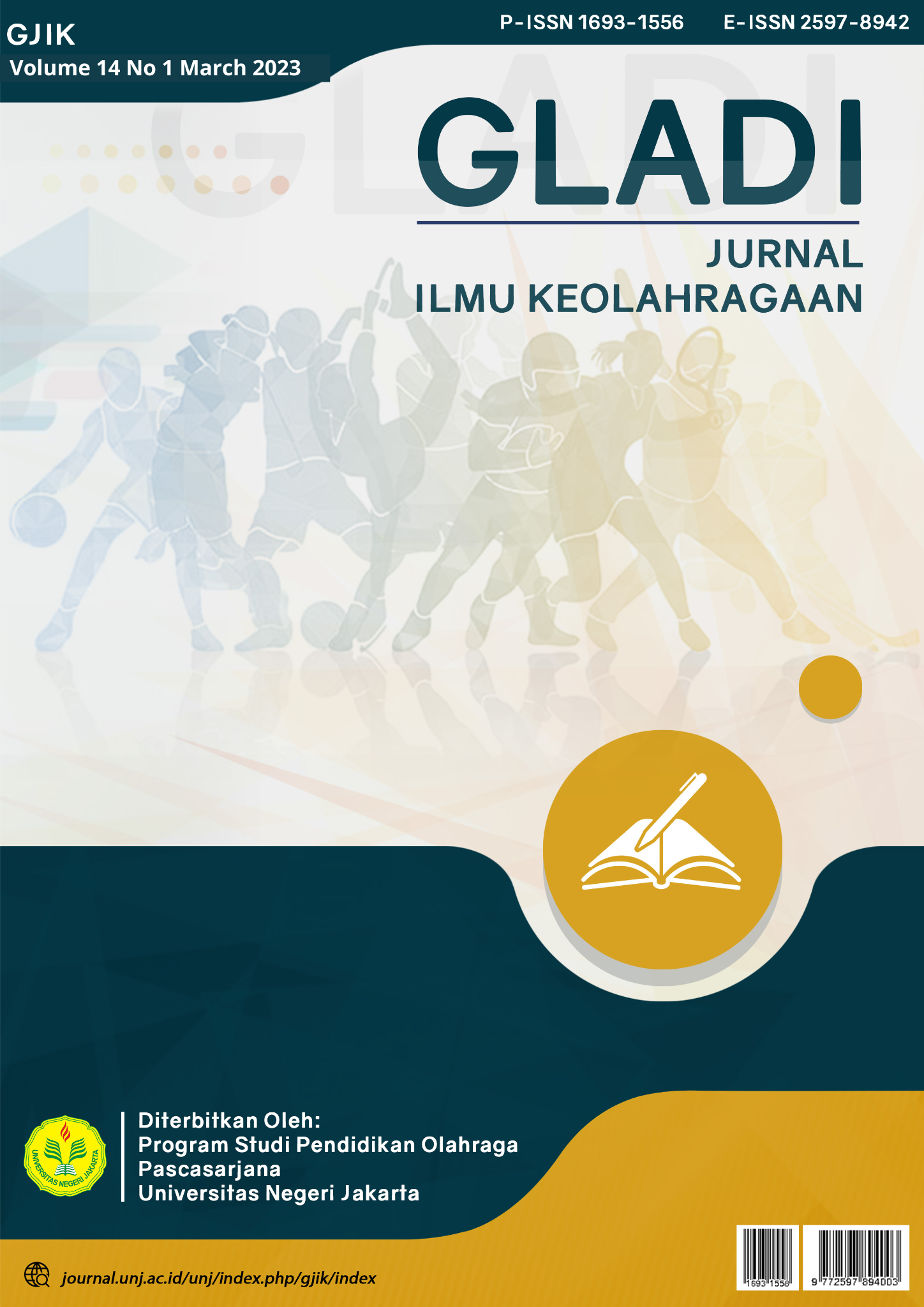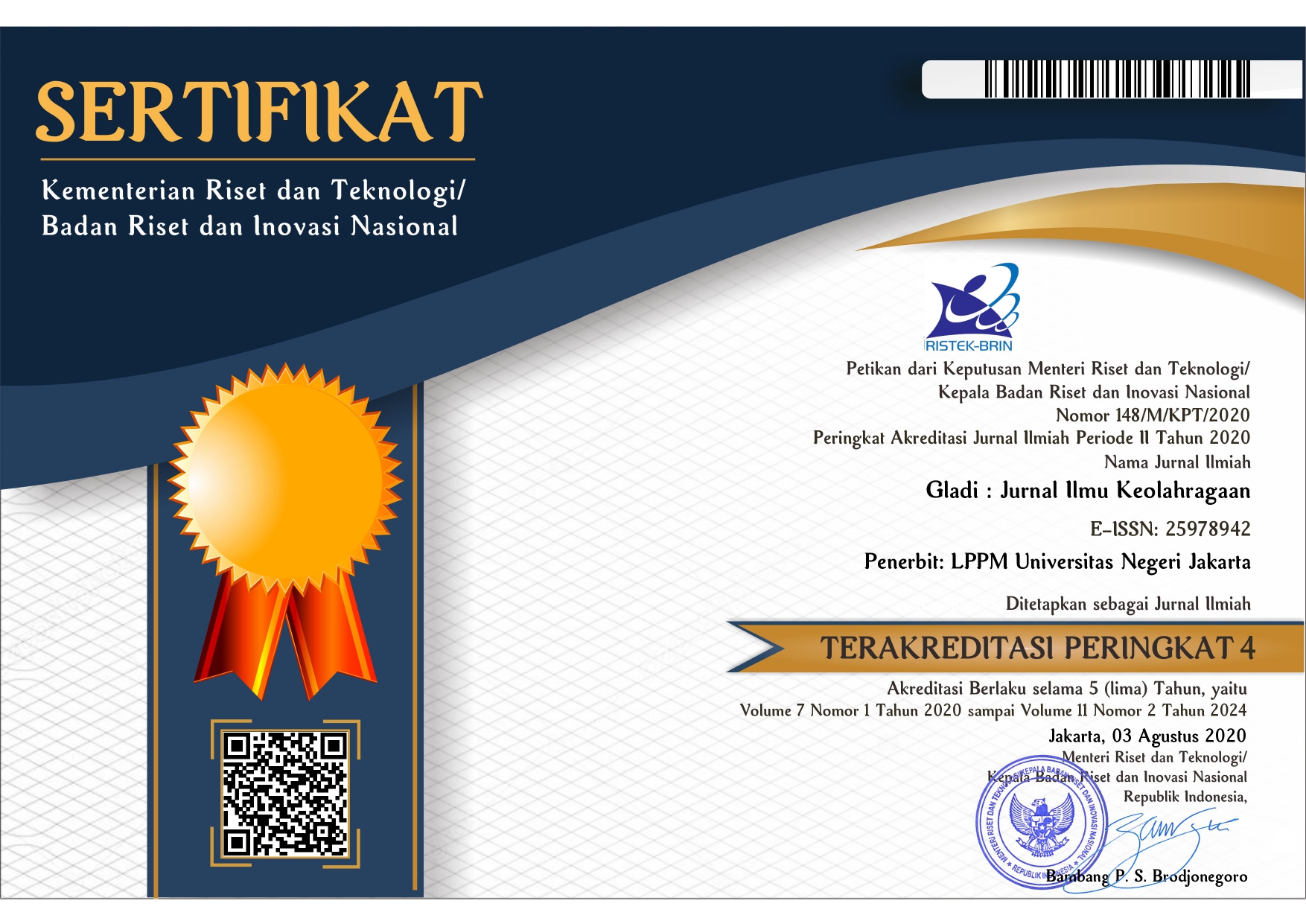Evaluation of the achievement development program of the dki jakarta province softball sports
Keywords:
Evaluation; Achievement Development Program; SoftballAbstract
This research aims to obtain facts, data, and information about the results of the evaluation of the achievement coaching program for the women's softball sports of DKI Jakarta Province. This study used evaluative methods with the CIPP model. Data collection techniques use questionnaires, documentation, observations, and interviews. The subjects of this study are The Core Board, Coach, and Athlete. The results revealed that the context component of the Pengprov Perbasasi DKI Jakarta already has a long-term, medium, and short-term plan. However, the DKI Jakarta Provincial Women's Softball Team was only able to achieve the goal of the achievement coaching program at the 2018 Softball National Tournament. The input components, facilities, equipment, and equipment provided are enough to meet the needs of the DKI Jakarta Provincial Women's Softball Team. However, the need for supplements and vitamins for new athletes ahead of the implementation of PON. In the process component, the coaching staff implements a walking selection system and promotes and degrades athletes based on batting average data, left on base, running base in, accumulation of errors, & success in sacrifice. The training process was carried out face-to-face and virtually during the Covid-19 pandemic. In the product component, the results obtained by the DKI Jakarta Provincial Women's Softball Team during the period 2018 to 2022 were finalists in the 2018 Softball National Tournament. However, in the 2019 PON Qualification and PON XX Papua in 2021, the DKI Jakarta Provincial Women's Softball Team was only able to rank fifth
Downloads
References
Andersen, P., & Vandehey, M. (2012). Career Counseling and Development in Global Economy. Brooks/ Cole Cengage Learning.
Brown, D. & A. (2002). Career Choice and Development (Fouth Edition). John Wiley & Sons, Inc.
Coertse, S., & Schepers, J. . (2004). Some personality and cognitive correlates of career maturity. SA Journal of Industrial Psychology, 30(2), 56–73.
Dillard, J. . (1985). Life Long Career Planning. A Bell & Howell Company.
Erdoǧmu, N., & Esen, M. (2011). An investigation of the effects of technology readiness on technology acceptance in e-HRM. Procedia - Social and Behavioral Sciences, 24(May 2014), 487–495. https://doi.org/10.1016/j.sbspro.2011.09.131
Gabbidon, Penn, & Richards. (2003). Career Choices and Characteristics of African-American Undergraduates Majoring in Criminal Justice at Historically Black Colleges and Universities. Journal of Criminal Justice Education, 2(14), 229.
Gati, I. (2001). High School Students’ Career-Related Decision-Making Difficulties. Journal of Counseling & Development, 79, 331–341.
Hutasuhut, E. (1991). Pendapat Siswa Tentang Materi Bimbingan Karir yang Membantu Perencanaan Karirnya. Universitas Pendidikan Indonesia.
Jatmika, D. (2015). Gambaran Kematangan Karir Pada Mahasiswa Tingkat Akhir. Psibernetika, 8(2), 185–203. http://weekly.cnbnews.com/news/article.html?no=124000
Manrihu, M., & T. (1992). Pengantar Bimbingan dan Konseling Karir. Bumi Aksara.
Merrick, E. N. (1995). Adolescent childbearing as career “choice”: Perspective from an ecological context. Journal of Counseling and Development, 73(3), 288.
Mubiana, P. B. (2011). Career maturity, career knowledge, and self knowledge among psychology honours students : an exploratory study.
Nurdin. (2011). Peningkatan Sumber Daya Manusia Melalui Pendidikan Islam. Dinamika Ilmu, 11(1).
Nurlillah, S. (2017). Program Bimbingan Karir Untuk Meningkatkan Kematangan Karir Mahasiswa. Journal of Innovative Counseling : Theory, Practice & Research, 1(1), 67–85.
Rahmaniar. (2011). Pelaksanaan Bimbingan Karir bagi Siswa SMA sebagai Persiapan Awal Memasuki Dunia Kerja. SELAMI IPS, 34(1).
Revila. (2015). Kematangan Karir Mahasiswa Jurusan Tarbiyah Sekolah Tinggi Agama Islam Negeri (STAIN) Samarinda. Fenomena, 7(1).
Santrock, J. (2007). Remaja. Penerbit Erlangga.
Sharf, R. (1992). Applying Career Development Theory to Counseling. Cole Publishing Company.
Supriatna, M. (2009). Layanan Bimbingan Karir di Sekolah Menengah. Departemen Pendidikan Nasional Universitas Pendidikan Indonesia.
Udoro, D. (2020). Obsesi Orang Tua atau Cita-Cita Anak? http://dworo.wordpress.com/2010/05/17/obsesi-orang-tua-atau-cita-cita-anak/
Winkel, W. S. (1991). Bimbingan dan Konseling di Institusi Pendidikan. PT Gramedia Widiasarana Indonesia.
Wong, C., Ping-man, Peng, & Z, K. (2011). An Explonatory Study on the Relationship between Parents’ Career Interest and the Career Interst of Young Adults. International Journal of Education and Vocational Guidance, 11, 39–53.
Yusuf, S. (2011). Psikologi Perkembangan Anak & Remaja. PT Remaja Rosdakarya.







